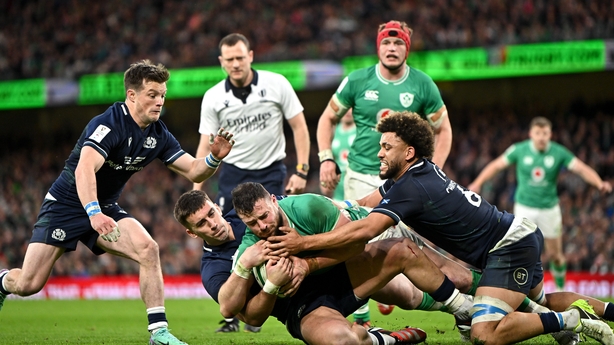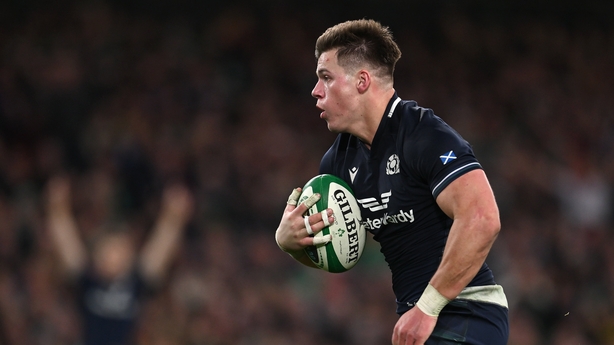It wasn't a vintage Ireland performance against Scotland on Saturday, but the harsh reality for the Scots is that it didn't need to be.
It took Andy Farrell's side 65 minutes to put some daylight between themselves and the visitors, and although the concession of a late try to Huw Jones brought the scoreline back to 17-13 and set up a potentially nervy final two and a half minutes, it never materialised, with Scotland's final possession of the game ending with yet another error in the middle of the pitch.
Were it not for the relentless defensive performances of Andy Christie and Scott Cummings, whose combined 53 tackles amounted to 22% of Scotland's total, Ireland would likely have won the game on the bridle.
Ireland's lineout was effective, even allowing for a couple of creaks, but their most dominant scrummaging performance of the last two years laid the platform for the constant territory and possession they enjoyed, particularly in the third quarter of the game.
From the 40th to the 70th minute, the champions produced some of their best, and also some of their most frustrating rugby of the championship.
From the moment James Lowe shook off two tackles down the left wing to open a gap and send Bundee Aki into space, there was an extra purpose and aggression to Ireland's ball-carrying, as they moved away from a kick-heavy first half to a more direct style of play. Scotland showed admirable determination as they continued to make tackle after tackle, but it came at a cost as they lost the penalty count 8-1 in that 30-minute period. That, combined with a long kicking game saw them invite further pressure.
The frustration for Ireland was the conversion rate. Tadhg Furlong was perhaps unlucky to see his potential try not given by the TMO, before an incredible last-ditch tackle by Cameron Redpath held Robbie Henshaw up. Jordan Larmour, Garry Ringrose and Calvin Nash, meanwhile, fluffed their lines with poor knock-ons deep in the 22.

Their inability to take advantage of those chances shouldn't be a major concern for Farrell, with the previous four games of this championship showing that when they've been in a position to score, they've usually been quite efficient.
Their attack may not have been clinical on Saturday, but their defence certainly was. The 13 points registered by Scotland rounded Ireland's 'points conceded' total to 60 in the championship - an average of 12 per game, and just under half the total of the next best team.
Even in the periods where it looked like Ireland were struggling to press home their advantage, there was a comfort blanket that all of the rugby was being played close to the Scottish line. For 77 minutes, up until the point that Huw Jones scored Scotland's only try, the visitors had barely had a sniff of five-pointer.
In those first 76 minutes, Scotland had possession three times in the Irish 22, with those three entries amounting to a total of roughly 19 seconds.
Their first entry on four minutes came after Ireland conceded a free-kick off a lineout, and a quick-tap penalty was swiftly turned over by Joe McCarthy. On 16 minutes they briefly made it into the redzone for two phases while on advantage, only to go back for the penalty, while the only other foray into the Irish 22 saw Jack Dempsey throw an interception within a second of crossing the white line.

In the first 40 minutes, we saw the residuals of last week's defeat at Twickenham where Ireland appeared to lack some purpose.
They seemed reluctant to play through multiple phases, with a series of grubber kicks into the corner of the pitch looking to pin Scotland back, in the hope of either forcing a rushed clearance, or challenging the lineout.
"I actually thought, in the conditions, we weren't as direct as what we should have been in the first half," Farrell said.
"I've thought sometimes we parked up, instead of getting around the corner [of rucks]. I think you'll look at that first ten minutes of the second half when the forwards are coming around the corner and piling into them it was very hard to stop."
That first half kicking strategy took the sting out of the Irish attack, and although the first two grubbers from Jack Crowley and Lowe were well-weighted, Crowley misjudged his next two attempts, which stalled any potential momentum.
For Crowley, his first Six Nations campaign after stepping out from the shadow of Johnny Sexton will go down as a success.
The Munster man (below) played every minute of every game as he helped steer his side to a title, although by his own admission he's still finding his feet in the international game.

And Farrell says he's been impressed with how his out-half has handled himself, under considerable pressure.
"Jack's a realist. And do you know what? I've been hard of him, we have," the Ireland coach added.
"And Jack will tell you that because it's easy to read the press isn't it, with you guys, and get carried away that, you know, 'I'm doing it, and I am doing really well'.
"We've kept his feet on the ground and Joe McCarthy as well and people like that because there has to be a realisation that that is not it, that's not what we are chasing.
"We are chasing something better than that and as long as we can continue to do that we'll continue to grow as a group.
"To be consistently at your best is probably impossible but that is what we're going after like I keep on saying. But when class players drop out of the squad, it's always going to take time to build back up and if you can do that winning, or learning from the experiences like at Twickenham or whatever, then that’s all well and good.
"But the reality is that there’s plenty more in us and there has to be for what’s coming for the rest of the year," he added.
Next on the agenda for Farrell and his side is a two-Test series away to the world champions South Africa this summer.
And Farrell knows his side will need to find another gear when they travel to Pretoria and Durban in July,
"Yeah, it doesn't get any more difficult, does it, or any more exciting than that.
"All you want is an opportunity to put yourself out there against the best and South Africa are 100% the best, so being able to go out there and test ourselves over there - we've managed to win one game over there before - to be able to play two games and test ourselves will be great for our development going forward."


